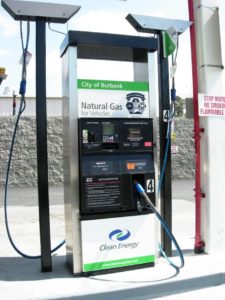
The federal government would be saving about $1.5 billion annually if the Natural Gas Vehicles project, an initiative that was first introduced by Nigerian Gas Company (NGC), in 1989 is sustained
The Project reportedly achieved a modest success with the only downside being the unavailability of Compressed Natural Gas (CNG) stations.
The federal government had in 2007 granted license to NIPCO Plc to implement pilot project in Benin City, Edo State, in partnership with NGC, which led to the formation of a Joint Venture, JV company, known as “Green Gas Ltd” . The JV successfully implemented the pilot with nine operational CNG stations catering to over 4000 NGVs.
According to the managing director of NIPCO Plc, Sanjay Teotia, the federal government, between 2012 and 2016 saved over $10 million in foreign exchange, adding that the NGVs provides lot of prospects and opportunities for countries that have realized the need, created awareness and made appropriate regulations for using natural gas as a vehicular fuel.
Teotia said the project presents significant potential for gas utilization in Nigeria as the economic situation is mainly driven by fuel pricing and scarcity of petroleum products, while fuel pricing issue is driven by the “excessive subsidy” required by government to maintain availability of refined products
According to Teotia, with 1 million vehicles on natural gas, Nigeria will be saving foreign exchange of about $1.5 billion it required in purchasing 4 billion liters of Premium Motor Spirit, PMS, also called petrol annually.
Listing the benefits of the initiative, the managing director said that apart from natural gas being a clean, economical and domestic fuel resource, NGV technology is available, proven and cost competitive just as renewable natural gas provides a path to near zero carbon.
He said: ‘‘Globally natural gas industry is increasing its focus and effort to support natural gas transportation. But policy and regulatory support is needed to create programs and incentives on par with those for other fuels.’’
The project if realised will further reduce over dependence on imported oil, save valuable foreign exchange, reduce subsidy burden on government and usher in utilization of Nigeria’s own domestic gas with substantial reductions in emissions resulting in improved air quality of the city and Reduced health costs, he said.
On safety regulations, Teotia informed that countries that have adapted NGVs have enacted extensive technical and safety standards for both NGVs and CNG dispensing stations and that ISO standards have already been established for design of various components of the NGV fuel system, He said that these regulatory requirements can be adapted to the Nigerian situation.
However the project is being stalled as government has not provided enabling environment to allow it thrive. The conversion kit as well as other components are currently imported and the high cost of conversion from petrol to CNG range from N150,000 to N200,000, which has discouraged a lot of vehicle owners especially commercial vehicle operators from opting to CNG.
Some of the requests by firms interested in investing in the project is tax waiver on imported conversion kits and Central Bank of Nigeria (CBN) special foreign exchange allocation to operators.
Teotia noted that most vehicles used for public transport are privately owned, with each person having one or more vehicles and that of these vehicles are brought as used vehicles at prices ranging from USD2000 to USD8000, adding that such owners cannot afford to invest another USD1000 in conversion.
“One possible way is that the gas company provides an attractive conversion package to the vehicle owner and also allows the gas company to recover its contribution through gas sales. This will require “SPECIAL GAS PRICING” from government to keep the end price attractive to the customer, government shall provide subsidy to vehicle owners for CNG conversion”, he argued.
He also recommended that CNG dispensing stations have to be tied to the gas pipeline network, which currently exist only in the Southern part of Nigeria which lie between Eastern and Western domestic gas network, while conscious efforts be put by Government to ensure Gas Pipeline Availability across the country.
Providing further insight on the project, the group managing director, NIPCO Plc. Venkataraman Venkatapathy, said that the diversification of the company’s operations into the natural gas created a vista of opportunities for the enhancement of local content in the industry.
He said the Compressed Natural Gas (CNG) revolution had offered alternatives for motorist to power their vehicles with gas courtesy of the partnership with Nigerian Gas Company, a subsidiary of the Nigerian National Petroleum Corporation.